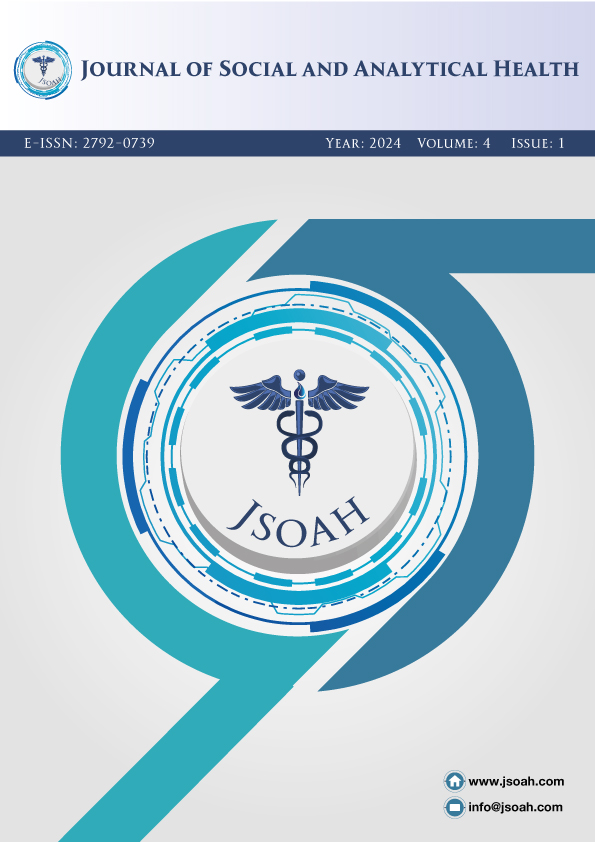Examination of death anxietys of earthquake victims in Turkey
DOI:
https://doi.org/10.5281/zenodo.10976044Keywords:
Death anxiety, earthquake, nursingAbstract
Aim: In this study, it was conducted to evaluate the relationship between Death Anxiety and what people experienced and lost during and after the earthquake after two major earthquakes in a row.
Materials and Methods: This research was conducted as a descriptive study. The universe of the study consisted of 278 people in Malatya, where two major earthquakes were experienced on February 6, 2023. The data of the research Death Anxiety Scale were used.
Results: Death Anxiety Scale score of earthquake survivors in the study was 51.51±21.83. A statistically significant relationship was found between the earthquake victims' age, gender, being alone at the time of the earthquake, being under the collapse in the earthquake, those who witnessed death in the earthquake and losing a loved one in the earthquake and the Death Anxiety Scale. It was determined that the earthquake victims' Death Anxiety Scale score was high.
Conclusion: According to these results, it is observed that those who experienced earthquakes were left alone with many traumatic events after the earthquake and were mentally worn out in this process.
References
Halpern J, Vermeulen K. Disaster mental health interventions: Core principles and practices. 2017; Taylor & Francis.
AFAD, [homepage on the Internet]. Ministry of Interior Disaster and Emergency Management Presidency [updated 6 March 2024; cited 1 April 2024]. Available form: https://www.afad.gov.tr/deprem-nedir
TMMOB [homepage on the Internet]. Chamber of Civil Engineers February 6, 2023 Kahramanmaraş, Pazarcık and Elbistan Earthquakes Preliminary Evaluation Report (2023). [updated 6 March 2024; cited 1 April 2024]. Available form: https://www.imo.org.tr/Eklenti/8175,imo-deprem-raporu-2pdf.pdf?0
WHO [homepage on the Internet]. Pan American Health Organization Mental Health and Psychosocial Support in Disaster Situations in the Caribbean. Health response to the earthquake in Haiti January 2010. Lessons to be learned fort he next massive sudden onset disaster. 2012. [updated 6 March 2023; cited 6 March 2024]. Available form: https://iris.paho.org/bitstream/handle/10665.2/52841/9789275132524_eng.pdf?sequenc%20e=1&isAllowed=y
US [homepage on the Internet]. Department of Veteran Affairs. Effects of Traumatic Stress after Mass Violence, Terror, or Disaster. 2017. Risk and Resilience Factors After Disaster and Mass Violence [updated 6 March 2024; cited 1 April 2024]. Available form: https://www.ptsd.va.gov/professional/treat/type/disaster_risk_resilience.asp
Bilge Y, Emiral E, Demirci H. Early Aftermath of February 6 Earthquakes in Turkey: PTSD, PTG, and Resilience. Journal of Loss and Trauma. 2023; 29(2): 221-242.
Ursano RJ, Fullerton CS, Weisaeth L, Raphael B. (Eds.). Textbook of disaster psychiatry. Cambridge University Press, 2017.
TPA. [homepage on the Internet]. Turkish Psychiatric Association, [updated 6 March 2024; cited 1 April 2024]. Available form: https://psikiyatri.org.tr/
Karaca F. The Psychology of Death. Istanbul, Beyan Publications, 2000.
Singh RS. Death anxiety among aged Manipuris, India. ZENITH International Journal of Multidisciplinary Research. 2013;3(1):209–216.
Aan de Stegge BM, Tak LM, Rosmalen JGM, Oude Voshaar RC. Death anxiety and its association with hypochondriasis and medically unexplained symptoms: A systematic review. J Psychosom Res. 2018;115:58-65.
Kirmayer LJ, Young A. Culture and somatization: clinical, epidemiological, and ethnographic perspectives. Psychosomatic Medicine. 1998;60(4):420-430.
Katon W, Sullivan M, Walker E. Medical symptoms without identified pathology: relationship to psychiatric disorders, childhood and adult trauma, and personality traits. Annals of Internal Medicine. 2001;134(2):917-925.
Prati G, Catufi V, Pietrantoni L. Emotional and behavioural reactions to tremors of the Umbria-Marche earthquake. Disasters. 2012; 36(3): 439-451.
Prati G, Pietrantoni L. Optimism, social support, and coping strategies as factors contributing to posttraumatic growth: A meta-analysis. Journal of Loss and Trauma. 2009;14(5): 364-388.
Şeker BD, Akman E. Emotional, cognitive, and behavioral reactions after the Van earthquake: a police sample study. Uludag University Faculty of Arts and Sciences Journal of Social Sciences. 2014;15(27): 215-231.
Bilici R, Tufan E, Turhan L, Uğurlu GK, Tan S, Kaşan T. Deprem sonrasında bireylerin anksiyete düzeyleri ve etkileyen faktörler: elazığ merkezli bir ön çalışma. Fırat Tıp Dergisi. 2013;18(1): 15-19.
Yazıcıoğlu Y, Erdoğan S. SPSS applied scientific research methods. Detay Yayıncılık, 2014.
Sarıkaya Y, Baloğlu M. The development and psychometric properties of the Turkish death anxiety scale (TDAS). Death Studies. 2016;40(7):419-431.
Kandemir F. An empirical research on the relationship between religiosity and death anxiety of the COVID-19 pandemic generation in the context of some demographic variables. Tokat Journal of Science. 2020;8(1): 99-129.
Sarman A. Factors affecting the symptoms of depression and anxiety level of children living in primary age after the destructive earthquake in The Karakocan town of the city of Elazig in Turkey. Master's Thesis. Sağlık Bilimleri Enstitüsü. 2012.
Zyga S, Malliarov M, Lavdaniti M, Athanasopoulov M, Sarafis P. Greek renal nurses’ attitudes towards death. Journal of Renal Care, 2011;37(2):100-107.
Işik E, Fadiloğlu Ç, Demir Y. Validity and reliability study of the Turkish translation of the attitude towards death scale in nurse population. Turkish Journal of Research & Development in Nursing. 2009;11(2):20-28.
Benli SS, Yıldırım A. The relationship between life satisfaction and attitude towards death in nurses. Gumushane University Journal of Health Sciences. 2017;6(4): 167-179.
Kurt E, Gülbahçe A. Van depremini yaşayan öğrencilerin travma sonrası stres bozukluğu düzeylerinin incelenmesi. Atatürk Üniversitesi Sosyal Bilimler Enstitüsü Dergisi. 2019:23(3): 957-972.
Khan MM. Earthquake 2005: challenges for Pakistani psychiatry. International Psychiatry. 2006;3(3):21-23.
Zhang Z, Wang W, Shi Z, Wang L, Zhang J. Mental health problems among the survivors in the hard-hit areas of the Yushu earthquake. Plos One Journals. 2012;7(10): 44-49.
Downloads
Published
How to Cite
Issue
Section
License
Copyright (c) 2024 Journal of Social and Analytical Health

This work is licensed under a Creative Commons Attribution-NonCommercial 4.0 International License.


